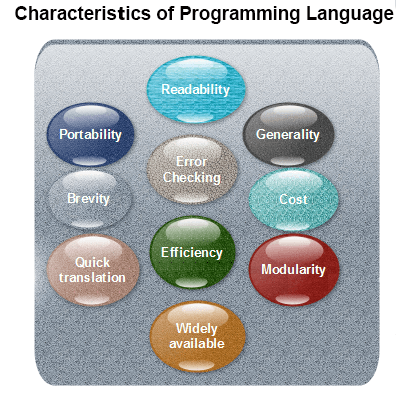Characteristics of programming language?
Following are the characteristics of Programming Language:

Readability: A good high-level language will allow programs to be written in some methods that resemble a quite-English description of the underlying functions. The coding may be done in an essentially self-documenting way.
Portability: High-level languages, being virtually machine-independent, should be easy to develop portable software.
Generality: Most high-level languages allow the writing of a vast collection of programs, thus relieving the programmer of the need to develop into an expert in many diverse languages.
Brevity: Language should have the ability to implement the algorithm with less amount of code. Programs mean in high-level languages are often significantly shorter than their low-level equivalents.
Error checking: A programmer is likely to make many errors in the development of a computer program. Many high-level languages invoke a lot of bugs checking both at compile-time and run-time.
Cost: The ultimate cost of a programming language is a task of many of its characteristics.
Quick translation: It should permit quick translation.
Efficiency: It should authorize the creation of an efficient object code.
Modularity: It is desirable that programs can be developed in the language as several separately compiled modules, with the appropriate structure for ensuring self-consistency among these modules.
Widely available: Language should be widely available, and it should be feasible to provide translators for all the major machines and all the primary operating systems.
A coding standard lists several rules to be followed during coding, such as the way variables are to be named, the way the code is to be laid out, error return conventions, etc.
Comments
Post a Comment